
If you’ve ever tried searching Google for an “assessment tool”, I’m sure you discovered that the search results are confusing, to say the least. Assessment tools have been around for ages, but in the last decade, the term got a couple of new meanings.
And while there are
a ton of resources around, there isn’t a single article that helps you filter
out and select the right tool for what you need. Until today!

Let’s start off on
the right foot:
What is an
assessment (tool)?
An assessment is making a
judgment about a person or a situation, based on all the information
surrounding that subject. Practically speaking, this usually done by a series
of questions with a score or categorization that return some type of result.
This is a very
general definition. Based on context, a differentiation can be made for what
purpose they are used (think: human resources, recruitment, marketing,
education, finance, …).
An assessment tool is the
software that helps you set up such an assessment and analyze the results.
·
The term “assessment tool” is often used to describe the assessment methodology. A methodology is
a way of assessing the subject based on a specific theory or framework.
·
A well-known assessment methodology in personality testing is the Myers-Briggs type
indicator where an assessment will assign one of 16 existing personality types
or stereotypes to the respondent. The personality types are based on
extraversion versus introversion, sensing versus intuition, thinking versus
feeling and judgment versus perception.
·
Another widely-used methodology is the DISC assessment. It’s
a personality test which states that each person scores on 4 personality
styles: Dominance, Influence, Steadiness, and Conscientiousness. Based on their
score, a respondent gets assigned one of the 4 personality types which are
often associated with the colors red, blue, green and yellow.
·
An assessment tool can also be seen as the means that are used to
execute the assessment either digitally or with pen and paper. The latter can be simple and are
often used in educational settings. Yes/No cards, Thumbs up/down, Mind mapping
are all examples of formative
assessment tools.
In this article, we
will focus on the digital assessment tools (= assessment software),
more specifically on how you should select digital assessment tools depending
on your specific needs.

The
biggest confusion that exists in choosing an assessment tool is that some tools
are linked to a specific methodology, for example, a software specifically
created for DISC assessments. Moreover, some vendors also mix services and
software into a bundled offering, such as HR services in combination with
assessments.
For
this article, we’ll focus only on selecting the right digital assessment tool
(assessment software), independently of the assessment
methodology or any associated services.
Selecting the right assessment tool
To select the right
software to build your assessment, there are two main questions you should ask
yourself. Based on these identifiers, you’ll find useful links and a suggestion
of tools for your specific needs in the overview below.
1. Is the context of your assessment for schools/universities or
business?
In a professional
setting, business
assessments can evolve around learning and coaching,
recruitment, diagnostics and progress measuring or marketing.
In a
school/university setting, assessments evolve around learning and personal
progress. They can be formative, summative, objective or subjective. Read more
on each specific approach for teacher
assessments here.
If you’re looking
to create an assessment for a non-profit or government institution, we suggest you
look at the solutions made for business assessments as they are more likely to
contain the features that you’ll be needing.
!! Keep an extra eye out for
reporting. Especially if you want to create business assessments. Most
assessment tools offer you aggregated reports. (Which means you get an overview
or average of 100 responses for example). Like this one:
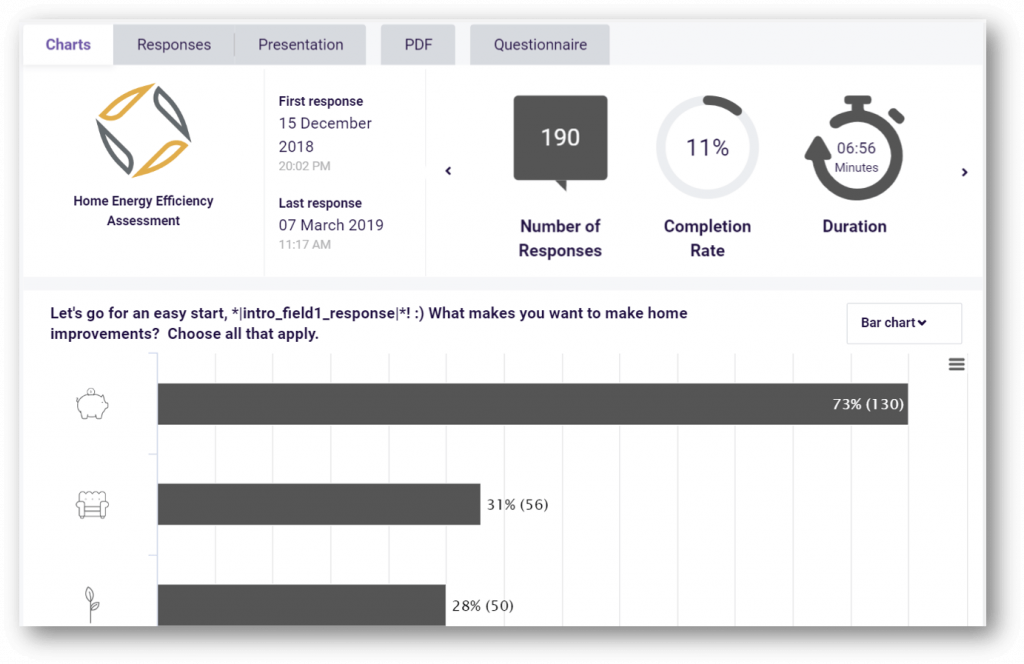
Whereas for the business-type of assessments we’re discussing in this article, it’s often necessary to offer individualized reporting. Personalized assessment reports, based on the results of one specific respondent that are generated right after the respondent fills out the assessment. These individualized reports allow you to provide value by giving immediate feedback. Like this one below, where a respondent just took an assessment about making your home more energy efficient. The report adds value by providing personalized tips, based on the respondent’s specific profile.
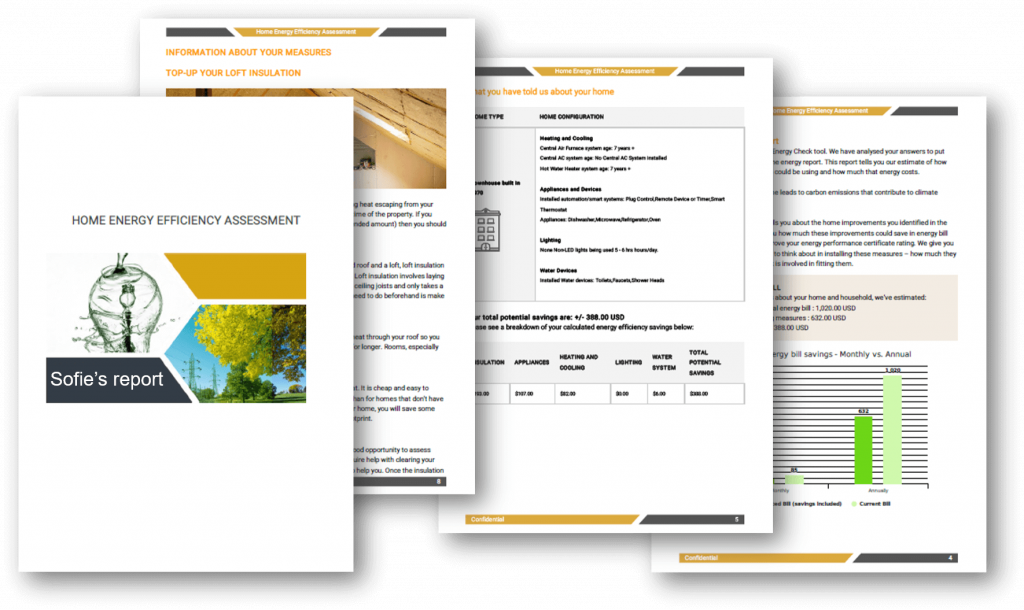
2. What’s the goal of your assessment?
The goal you should
have in mind can vary from simply “learning” to measuring progress, to
discovering if a person is the right profile fit or even generating leads.
Based on the
context of your assessment, these are the most common goals for creating an assessment.
Find the right assessment tool for your goal in the paragraphs below.
A. Business – HR learning and
coaching
B. Business – HR recruitment
C. Business – Professional services
D. Business – Marketing
E. Schools/Universities – Learning
B. Business – HR recruitment
C. Business – Professional services
D. Business – Marketing
E. Schools/Universities – Learning
Most of the
available assessment software tools focus on the educational type of
assessments. They are usually very affordable but are rarely useful for any
other purpose than evaluating students. On the other end, there are business
assessment tools. These often come at a high cost or can only be used with a
specific methodology or purchased in combination with services.
With the list of
tools and resources for each category, we wanted to offer you “the in-between”.
Affordable, standalone tools (like Survey Anyplace 😉 ) that you
can sign up for
today, independently of the methodology you use and not linked to any
consulting services you need to purchase. This list is a complete overview of
the features you need for your specific goals and audience.
Assessment tools for:
A. HR learning and coaching assessments (Business)
This type of
assessment exists to measure a person’s capabilities in a professional
environment. Either to make a decision on hiring a new employee or to gauge
their knowledge and skills while on the job.
For example:
An HR manager wants
to improve team dynamics of an existing department. By using a DISC assessment
they determine the different personality types that are currently in the team
and how their roles or current responsibilities could be better divided.
Functionalities needed:
When you start
looking for the right tool, these features will be useful to look out for.
·
Custom scoring with formulas which allows you to make advanced
calculations
·
Score weighting and scoring per question block to put more emphasis on
the score for specific question blocks or questions
·
Email invitations with personalization
·
Variable end messages based on the score
·
Personalized report for respondent (downloadable in PDF)
·
Results and progress per respondent in a dashboard
·
Result visualization in a spider graph, pie chart & other types of
visualization
Online assessment tools for (HR) learning and coaching:
1. Survey Anyplace ($)
The most reviewed and #1 rated assessment software for SMBs on Capterra. It lets you build assessments & entire learning campaigns. Using the advanced formulas and personalized outcomes will help both you and the respondent get deeper insights.
The most reviewed and #1 rated assessment software for SMBs on Capterra. It lets you build assessments & entire learning campaigns. Using the advanced formulas and personalized outcomes will help both you and the respondent get deeper insights.
2. Talentsoft ($$)
With a focus on collaboration between HR, managers, and employees, this talent management system helps employee growth through blended learning & testing.
With a focus on collaboration between HR, managers, and employees, this talent management system helps employee growth through blended learning & testing.
3. Docebo LMS ($$$)
This learning platform is built to train employees with a combination of formal, social and experiential tests to maximize learner performance.
This learning platform is built to train employees with a combination of formal, social and experiential tests to maximize learner performance.
B. HR recruitment assessments (Business)
A recruiting
assessment tool helps examine whether a person has the right
profile and capabilities for the job they’re applying to.
For example:
A recruiter wants
to assess the skill set and professional personality traits of a job candidate.
They want to get all the necessary information in a dashboard that points out
the most important results. Additionally, they’d like the applicant to receive
a report with insights. This report with results and remarks can be used as a
starting point for a follow-up conversation. (Learn more about this specific
example with this competency
assessments case study.)
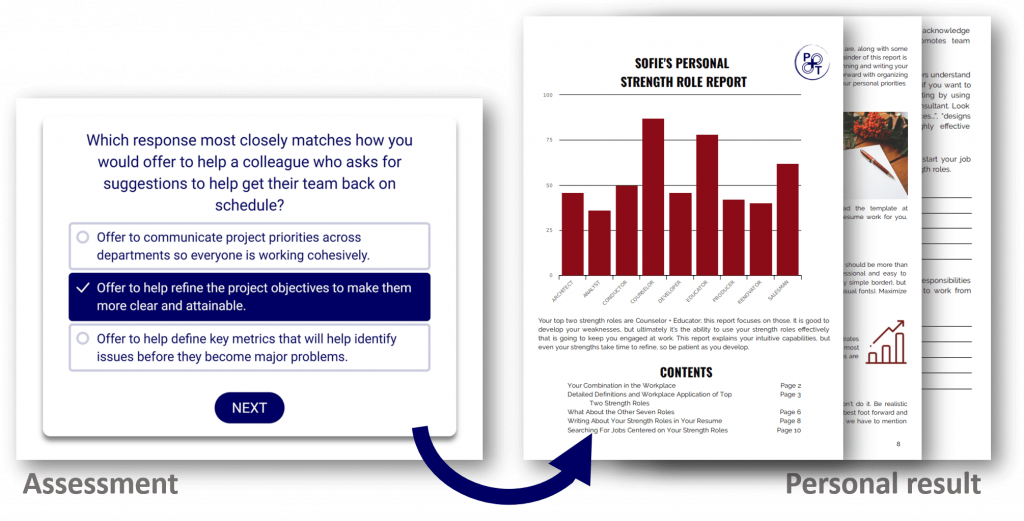
Functionalities needed:
When you start looking
for the right tool, these features will be useful to look out for.
·
Custom scoring with formulas to add a specific score to questions
and make advanced calculations
·
Question logic skip irrelevant questions or ask follow-up questions
based on a chosen answer
·
Score weights and scoring per question block to put more emphasis
on the score for specific question blocks or questions
·
Personalized report for respondent (downloadable in pdf)
·
Results per respondent
·
Question pool & randomization
·
Integration with other tools to export responses
Online assessment tools for HR recruitment:
1. Survey Anyplace ($)
The software lets you build self-assessments and quizzes that return personalized information. Results per respondent make it easy to compare applicants. Using the advanced formulas and personalized PDF reports will help both you and the respondent get deeper insights.
The software lets you build self-assessments and quizzes that return personalized information. Results per respondent make it easy to compare applicants. Using the advanced formulas and personalized PDF reports will help both you and the respondent get deeper insights.
2. Vervoe ($$)
Vervoe is a hiring platform that uncovers hidden talent through real-world tests, tasks, and tools designed by industry experts.
Vervoe is a hiring platform that uncovers hidden talent through real-world tests, tasks, and tools designed by industry experts.
3. Harver ($$$)
This pre-employment assessment platform uses scientifically validated assessments and situational judgment tests with a realistic job preview. Their AI algorithm measures a candidate’s aptitude, culture fit, soft skills and ability to succeed.
This pre-employment assessment platform uses scientifically validated assessments and situational judgment tests with a realistic job preview. Their AI algorithm measures a candidate’s aptitude, culture fit, soft skills and ability to succeed.
C. Professional services assessments (Business)
With these business assessments,
you can analyze progress and check diagnostics for a company or subdivision to
define improvements.
For example:
A consulting agency
offers courses and services to make your business more profitable. To build an
action plan, they assess the current state of their client with a maturity assessment for
example. Both the agency and the client receive the outcome and discuss steps
forward.
Ideally, a PDF report with
insights and suggested improvements is auto-generated and sent to the client to
help them in reaching a decision.
Functionalities needed:
When you start
looking for the right tool, these features will be useful to look out for.
·
White label option to have everything in your company branding with
company URL and reporting. And even send out email invitations from a white
label email address
·
Custom scoring with formulas to add a specific score to questions and
make advanced calculations
·
Question logic to skip irrelevant questions or ask follow-up questions
based on a chosen answer
·
Score weights and scoring per question block to put more emphasis
on the score for specific question blocks or questions
·
Automatic emails after taking the assessment that offer deeper insights
and invite respondents to stay in touch
·
Personalized report for respondent (Preferably downloadable in PDF)
·
Integration with other tools such as payment systems (e.g. Stripe) to
sell assessments to your clients.
Online assessment tools for professional services:
1. Survey Anyplace ($)
The software lets you build interactive, personalized maturity assessments. Using the advanced formulas, score weighting and personalized PDF reports will help you get deeper insights. Additionally, you offer your respondent additional value in the shape of a report with tailor-made bits of advice.
The software lets you build interactive, personalized maturity assessments. Using the advanced formulas, score weighting and personalized PDF reports will help you get deeper insights. Additionally, you offer your respondent additional value in the shape of a report with tailor-made bits of advice.
2. Form.com ($$$)
The platform provides advanced features that can be used to streamline any data collection processes, at the office or in the field, that use forms to capture data.
The platform provides advanced features that can be used to streamline any data collection processes, at the office or in the field, that use forms to capture data.
*This category only
lists two assessment tools to start working with. At this time, we couldn’t
find any additional software tools that offer the functionalities you need for
this type of assessments. A simple Google search will offer you a lot of
options, but all of these are in combination with additional services or offer
an assessment tool built for only one type of assessment (a risk assessment for
example).
D. Marketing assessments (Business)
Marketing
assessments are a type of interactive content that can be used for multiple
goals such as moving a prospect to the next stage in the sales funnel, building
a subscriber list or simply increasing engagement on site.
For example:
A marketer embeds
an assessment on their website. Visitors can take the assessment, the result is
a personalized outcome with the possibility of getting more detailed insights
and additional tips and tricks. To get access to the extras, the respondent
leaves their email in return for a personalized PDF report.
So the visitor gets insights and value, the marketer gets an email and insights
as well. (Read more about this example in this Boot Camp Digital case study.)
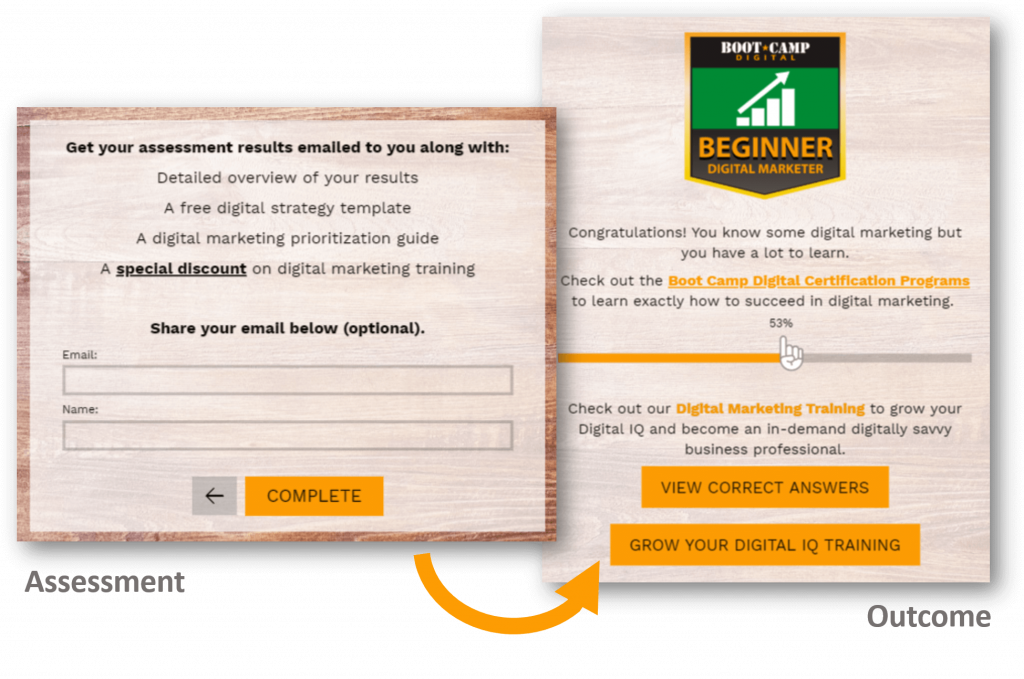
Functionalities needed:
When you start
looking for the right tool, these features might be useful to look out for.
·
White label option to have everything
in your company branding with company URL and reporting. And even send out
email invitations from a white label email address
·
Interactive elements such as piping to reuse previously given answers in
follow-up questions
·
Skip logic to skip irrelevant questions or to ask follow-up questions
based on a chosen answer
·
Smart screens in between questions with tips or other useful information
·
Easy to embed or integrate into your website, blog, … (e.g. with an
Iframe)
·
Flexible in design
·
Variable end message based on the score of the respondent
·
Automatic emails after taking the assessment that offer deeper insights
and invite respondents to take the next step in the funnel
·
Downloadable PDF to increase value (whitepaper, ebook, coupon, insights,
…)
·
Integrations with other tools to transfer respondent data
Online assessment tools for Marketing:
1. Survey Anyplace ($)
The software lets you build interactive assessments that help collect emails, guide prospects down the sales funnel and that return valuable information to the respondent.
The software lets you build interactive assessments that help collect emails, guide prospects down the sales funnel and that return valuable information to the respondent.
2. ClickFunnels ($$)
This funnel builder allows you to create flows that help guide new prospects deeper down the sales funnel. Part of the software allows you to build interactive content very similar to marketing assessments we talk about in the article.
This funnel builder allows you to create flows that help guide new prospects deeper down the sales funnel. Part of the software allows you to build interactive content very similar to marketing assessments we talk about in the article.
3. Snapapp ($$$)
SnapApp lets you build branded question-based interactions to uncover intent. It features templates, asset libraries, design tools, and global account settings to speed your time-to-market.
SnapApp lets you build branded question-based interactions to uncover intent. It features templates, asset libraries, design tools, and global account settings to speed your time-to-market.
E. School/University assessments (Education & learning)
This assessment
scenario works for students in a school or university environment. It’s used to
gauge the progress of a student compared to their learning objectives.
For example:
A teacher launches
a short assessment that students can take on their pc, testing whether or not
they grasp the theory.
Functionalities needed:
When you start
looking for the right tool, these features will be useful to look out for.
·
Question randomization and question pool
·
Final score with a percentage
·
Real-time results to show the answers during a presentation in the
classroom
·
Custom results per respondent that allow you to automatically give
one-to-one recommendations, etc.
·
Answer explanation per question, not only to give the correct answer but
to explain why it is the correct answer.
·
A personal portal where all tests per student are combined
·
Assessment sequences over time to track progress
Online assessment tools for learning:
1. BookWidgets ($)
Their tool lets you create interactive exercises and automatically graded test. Ideal and easy to use within any classroom. (Note: If you’re planning on making more advanced assessments, this tool might not be the right choice for you.)
Their tool lets you create interactive exercises and automatically graded test. Ideal and easy to use within any classroom. (Note: If you’re planning on making more advanced assessments, this tool might not be the right choice for you.)
2. Socrative ($$)
The Socrative app is built for playful classroom engagement. It helps with student learning, quizzes, polls, and assessments.
The Socrative app is built for playful classroom engagement. It helps with student learning, quizzes, polls, and assessments.
3. LoveMySkool ($$$)
This tool allows collaboration between educators, students, and parents and makes a constructive impact on learning outcomes.
This tool allows collaboration between educators, students, and parents and makes a constructive impact on learning outcomes.
That’s it!
Everything you need to know to select the right assessment tool. 🙂
There are, of
course, loads of tools and services out there. For this list, I selected the
ones that I feel can help you in building what you need without much additional
hassle or obligations. If you think I missed an essential one, let me know in
the comments!
By the way, you’ll
have noticed that Survey Anyplace is listed quite often… That’s because
assessments are our thing! Each of the scenarios and goals listed above can be
achieved with an assessment built in our tool.
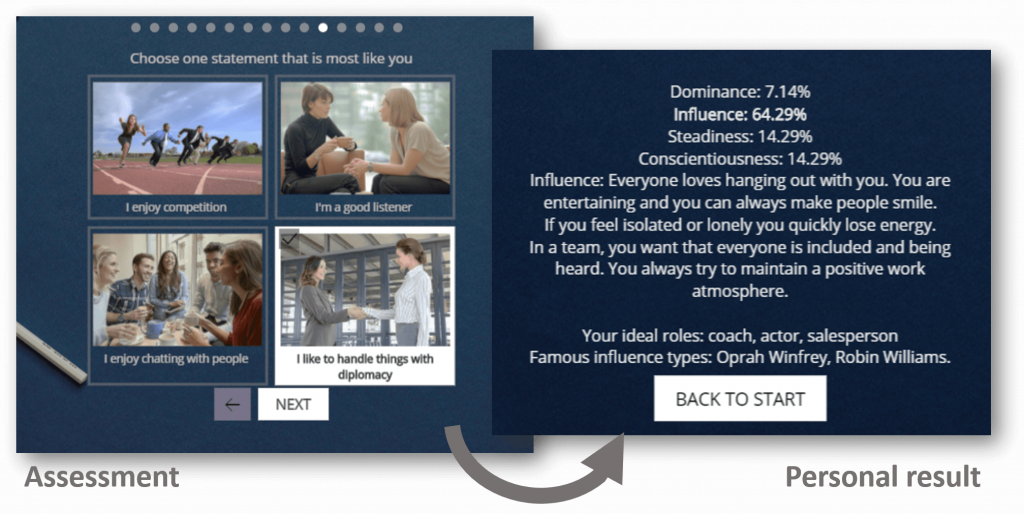
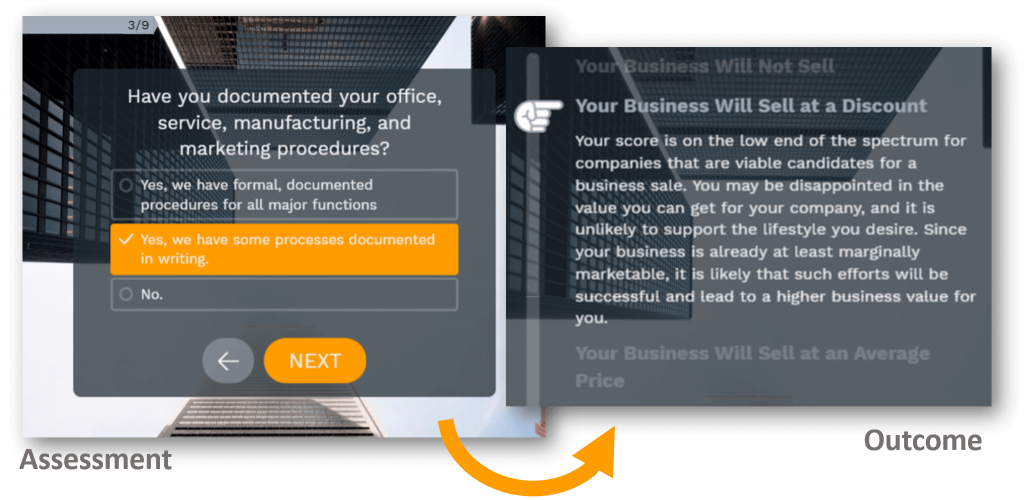
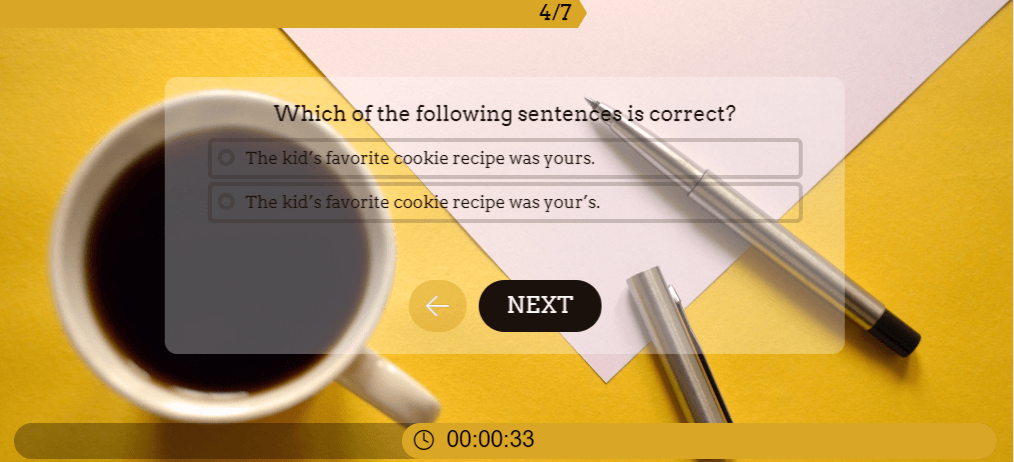
No comments:
Post a Comment